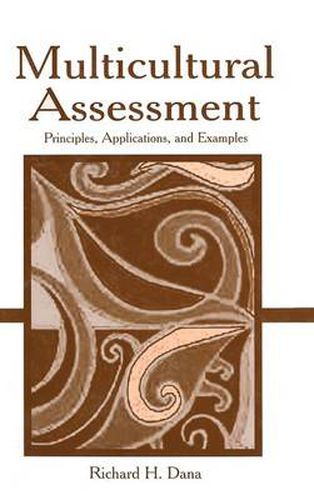Readings Newsletter
Become a Readings Member to make your shopping experience even easier.
Sign in or sign up for free!
You’re not far away from qualifying for FREE standard shipping within Australia
You’ve qualified for FREE standard shipping within Australia
The cart is loading…






Psychologists throughout the world are being asked to assess an increasingly diverse clientele: immigrants, refugees, second and third generations still influenced by different cultures and languages, and indigenous peoples now moving towards the mainstream. Most are ill-equipped by training and experience to understand, assess, and subsequently treat such clients competently and ethically. Virtually all agree on the need for culture-sensitive assessment, but it has proven difficult to provide adequate services, despite good intentions and funding. Too often, clients who may have different worldview and health-illness beliefs are marginalized. For many reasons, standard assessment instruments designed, researched, and normed on a few groups in the United States–the MMPI-2, the Rorschach, and the TAT–are used as though they were universally applicable. Most busy practitioners have little time to investigate alternatives developed for use with one new group or another, focused on one issue or another, generally in a research context. In this book, Richard Dana proposes a new model of multicultural assessment practice and points directions for future training and research. He presents general, culture-specific, and step-by-step instrument-specific guidelines for the use of the standard armamentarium with different groups. Throughout, he highlights exciting new interpretive possibilities the traditional tests offer that should be regularly exploited, but emphasizes the importance of recognizing psychometric limits. Four extended examples of the use of one or several instruments with a specific group offer concrete illustrations of the model in action.
$9.00 standard shipping within Australia
FREE standard shipping within Australia for orders over $100.00
Express & International shipping calculated at checkout
Stock availability can be subject to change without notice. We recommend calling the shop or contacting our online team to check availability of low stock items. Please see our Shopping Online page for more details.
Psychologists throughout the world are being asked to assess an increasingly diverse clientele: immigrants, refugees, second and third generations still influenced by different cultures and languages, and indigenous peoples now moving towards the mainstream. Most are ill-equipped by training and experience to understand, assess, and subsequently treat such clients competently and ethically. Virtually all agree on the need for culture-sensitive assessment, but it has proven difficult to provide adequate services, despite good intentions and funding. Too often, clients who may have different worldview and health-illness beliefs are marginalized. For many reasons, standard assessment instruments designed, researched, and normed on a few groups in the United States–the MMPI-2, the Rorschach, and the TAT–are used as though they were universally applicable. Most busy practitioners have little time to investigate alternatives developed for use with one new group or another, focused on one issue or another, generally in a research context. In this book, Richard Dana proposes a new model of multicultural assessment practice and points directions for future training and research. He presents general, culture-specific, and step-by-step instrument-specific guidelines for the use of the standard armamentarium with different groups. Throughout, he highlights exciting new interpretive possibilities the traditional tests offer that should be regularly exploited, but emphasizes the importance of recognizing psychometric limits. Four extended examples of the use of one or several instruments with a specific group offer concrete illustrations of the model in action.